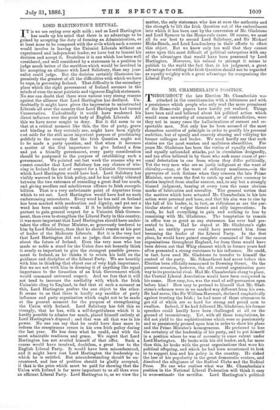LORD HARTINGTON'S REFUSAL.
IT is no use crying over spilt milk ; and as Lord Hartington has made up his mind that there is no advantage to be gained by accepting the duty of forming an Administration, or at least none to be compared with the evils which such a course would involve in leaving the Unionist Liberals without an experienced and independent leader, we have but to lament his decision and accept it. Doubtless it is one which has been well considered, and well considered by a statesman in a position to judge much better of the sacrifices which would be involved in his accepting an alliance with Lord Salisbury, than any jour- nalist could judge. But the decision certainly illustrates im- pressively the greatest of all the difficulties with which we have to cope, in governing Ireland. That difficulty is the secondary place which the right government of Ireland assumes in the minds of even the most patriotic and vigorous English statesmen. No one can doubt that there were various very strong reasons against the alliance that Lord Hartington has declined. Un- doubtedly it might have given the impression to uninstructed Liberals all over the country that Lord Hartington had turned Conservative. Undoubtedly it would have weakened his direct influence over the great body of English Liberals. All this we have never sought to deny. But it did seem to us that at a critical moment like this, the ties of party, grave and binding as they ceitainly are, might have been rightly cast aside for the still more important purpose of proclaiming publicly to the country that the Irish Question ought not to be made a party question, and that when it becomes a matter of the first importance to give Ireland a firm and yet a friendly government, every party consideration should be postponed to the purpose of establishing such a government. We pointed out last week the reasons why we cannot consider that Lord Salisbury has any chance of win- ning in Ireland the sort of respect for a Unionist Government which Lord Hartington would have had. Lord Salisbury has visibly wavered in his Irish policy, and he has visibly vibrated between the two extremes of conceding a great deal too much, and giving needless and mischievous offence to Irish suscepti- bilities. That is a very unfortunate point of departure from which to set out. Lord Hartington would have had no such embarrassing antecedents. Every word he has said on Ireland has been marked with moderation and dignity, and yet not a word has been amiably weak. If it be infinitely more im- portant to gain general respect for a Unionist Irish Govern- ment, than even to strengthen the Liberal Party in this country, it was more important that Lord Hartington should have under- taken the office of Prime Minister, so generously tendered to him by Lord Salisbury, than that he should remain at his post of leader of the Moderate Liberals. But it is the very fact that Lord Hartington did not so judge, that discourages us about the future of Ireland. Even the very man who has made so noble a stand for the Union does not honestly think it nearly as important to give the strongest possible govern- ment to Ireland, as be thinks it to retain his hold on the guidance and discipline of the Liberal Party. We are heartily with him in thinking that object one of very high importance. But we are not with him in deeming it of anything like equal importance to the formation of an Irish Government which would command universal respect. And we fear that it will not tend to increase the cordiality with which the Irish Unionists cling to England, to find that at such a moment as this, Lord Hartington prefers the one object to the other. It seems to us that there is hardly any sacrifice of party influence and party organisation which ought not to be made
at the present moment for the purpose of strengthening the Union with Ireland. Lord Salisbury has felt this so strongly, that he has, with a self-forgetfulness which it is hardly possible to admire too much, placed himself entirely at Lord Hartington's disposal ; and that was all that was in his power. No one can say that he could have done more to redeem the conspicuous errors in his own Irish policy during the last year. He has done what he could, and with the most admirable readiness and grace. We regret that Lord Hartington has not availed himself of that offer. Such a course would have involved, doubtless, a great loss to the English Liberal Party. It would have been misunderstood, and it might have cost Lord Hartington the leadership to which he is entitled. But misunderstanding should be en- countered, and loss of position should be gladly accepted, if that is the price which must be paid for showing that the Union with Ireland is far more important to us all than even an efficient Liberal Party. Lord Hartington is, as we view the matter, the only statesman who has at once the authority and the strength to lift the Irish Question out of the embroilment into which it has been cast by the conversion of Mr. Gladstone and Lord Spencer to the Home-rule cause. Of course, we must all do our best to second Lord Salisbury, and Sir Michael Hicks-Beach, and Lord Londonderry in their efforts to effect this object. But we know only too well that they cannot enter upon this most difficult of political enterprises with any of the advantages that would have been possessed by Lord Hartington. Moreover, his refusal to attempt it seems to publish to the world the fact that, in his judgment, a great advantage for settling the Irish Question should not be regarded as equally weighty with a great advantage for reorganising the Liberal Party.


































 Previous page
Previous page